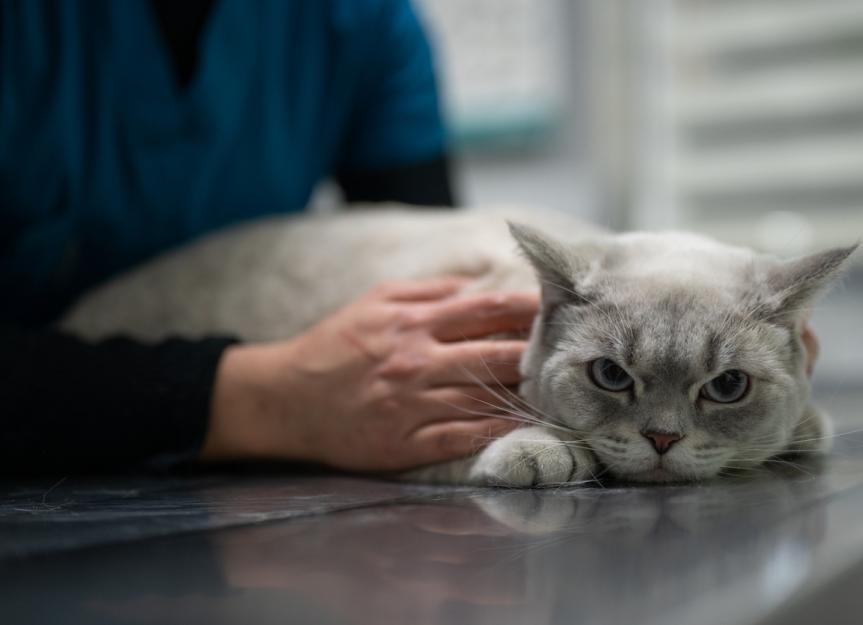Kittens are often a bundle of joy, bringing laughter and playfulness into our lives with their antics and curious nature. However, as a loving pet owner, it can be concerning to notice unusual behaviors in your furry friend, such as shaking or trembling. While the occasional shiver might be nothing to fret about, it could also signal an underlying issue that needs attention.
In this article, we’ll explore the various reasons why your kitten might be shaking, from benign causes like excitement and cold to more serious health concerns. We’ll also provide guidance on when it’s time to seek veterinary advice, ensuring your little companion stays happy and healthy. So, let’s dive in and understand what those tiny tremors might mean for your playful pal!
Table of Contents
- Understanding Your Kittens Shaking Behavior
- Common Causes of Shaking in Kittens
- When to Seek Veterinary Help
- Tips for Keeping Your Kitten Calm and Comfortable
- Q&A
- Future Outlook

Understanding Your Kittens Shaking Behavior
Kittens can exhibit shaking behavior for various reasons, and it’s essential to understand what these might be to ensure your furry friend is healthy and happy. Common causes include:
- Cold Temperatures: Kittens, especially those under six weeks old, may shake as a response to being too cold.
- Excitement or Playfulness: Sometimes, a burst of energy can lead to unintentional shaking, particularly during play.
- Stress or Anxiety: New environments or loud noises can make your kitten feel uneasy, prompting them to shake.
- Health Issues: Shaking can also be a symptom of underlying health problems such as infections, seizures, or neurological disorders.
If you observe shaking in your kitten, it’s important to monitor the behavior closely. Consider keeping a record to track when the shaking occurs and any other symptoms. A simple table can help you note these observations:
| Date | Time | Context | Additional Symptoms |
|---|---|---|---|
| 2023-10-01 | 3:00 PM | During playtime | None |
| 2023-10-02 | 7:30 AM | When startled by a loud noise | Hiding, vocalizing |
| 2023-10-03 | 5:00 PM | After coming inside from outside | Shivering, lethargy |
If the shaking persists or is accompanied by other concerning symptoms, consider reaching out to your veterinarian for further guidance. Understanding the context in which your kitten shakes is key to determining whether it’s a harmless quirk or a sign that they need medical attention.
Common Causes of Shaking in Kittens
Shaking in kittens can stem from various underlying issues, ranging from benign to serious. One common reason is excitement or anxiety. Kittens are naturally curious and may shake when they encounter new environments or experiences. This can manifest as trembling when they’re playing vigorously or encountering unfamiliar sights and sounds. Additionally, certain genetic conditions might make some kittens more prone to shaking, particularly if they have a family history of neurological conditions.
Another significant cause of shaking could be medical issues. Kittens may experience shaking due to low blood sugar, especially if they skip meals or are not eating enough. Other possible health concerns include fever, as a response to infections, or serious conditions such as hypothermia. Observing your kitten for other symptoms like lethargy or changes in appetite can help pinpoint the cause. If shaking is accompanied by any of the following signs, a visit to the veterinarian is advised:
| Symptoms | Action |
|---|---|
| Lethargy | Immediate vet appointment |
| Loss of appetite | Monitor closely; consult vet if prolonged |
| Vomiting or diarrhea | Seek veterinary care |
| Difficulty breathing | Emergency veterinary visit |
When to Seek Veterinary Help
Recognizing when your kitten’s shaking is a benign behavior versus a sign of distress can be challenging. While occasional tremors might not be a cause for concern, there are specific situations where immediate veterinary attention is warranted. If your kitten exhibits any of the following symptoms alongside shaking, it’s essential to seek professional help:
- Persistent shaking that lasts longer than a few minutes.
- Other unusual behaviors, such as lethargy or loss of appetite.
- Seizures or disorientation.
- Changes in breathing, like rapid or labored breaths.
- Visible pain or sensitivity when touched.
Additionally, certain health issues may indicate that your kitten’s shaking is more than just a quirky behavior. If you notice:
| Condition | Signs to Look For |
|---|---|
| Hypoglycemia | Weakness, confusion, irritability |
| Hypothermia | Cold to the touch, shivering, lethargy |
| Infections | Vomiting, diarrhea, fever |
| Neurological Issues | Changes in coordination, balance problems |
Timely intervention can make all the difference in your kitten’s health, so don’t hesitate to contact your veterinarian if you’re ever in doubt.
Tips for Keeping Your Kitten Calm and Comfortable
Keeping your kitten calm and comfortable is essential for their overall well-being, especially if they’re experiencing any shaking or anxiety. Start by creating a safe space where your kitten can retreat to if they feel overwhelmed. This cozy area could be a designated bed or a quiet corner with familiar toys and blankets. Ensure the environment is free from loud noises and sudden movements that may startle your furry friend. Additionally, gently engaging your kitten with interactive play can distract them from their anxieties, allowing them to release pent-up energy.
Another effective strategy is to maintain a consistent routine for feeding and playtime. Kittens thrive on schedules, and a predictable routine helps them feel secure. Consider using calming aids, such as feliway diffusers or soft, soothing music, to create a peaceful atmosphere. You can also explore natural remedies like catnip or cat calming treats, which can promote relaxation without any adverse effects. always pay attention to your kitten’s body language—if they seem agitated or restless, intervening with gentle affection or quiet time can significantly impact their stress levels.
Q&A
Q&A:
Q1: Why might my kitten be shaking?
A: Kittens can shake for various reasons, ranging from excitement and playfulness to anxiety or discomfort. Some common causes include fear or stress, illness, low blood sugar, or even cold temperatures. It’s essential to observe the context and accompanying symptoms to determine the cause.
Q2: Is it normal for kittens to shake when playing?
A: Yes, it’s quite common for kittens to shake or have little tremors when they are excited or engaged in play. This shaking is usually harmless and is a part of their energetic behavior. If the shaking stops as soon as the playtime ends, there’s typically no cause for concern.
Q3: My kitten is shaking and seems lethargic. Should I be worried?
A: Yes, if your kitten is shaking and also appears lethargic, it may indicate a health issue. Conditions like fever, low blood sugar, or other illnesses could be at play. It’s best to monitor your kitten closely and consult with a veterinarian if these symptoms persist or worsen.
Q4: Could shaking be a sign of an underlying medical issue?
A: Absolutely. Shaking can be a symptom of various medical conditions, including but not limited to neurological disorders, infections, or poisoning. If your kitten is shaking excessively or shows other troubling signs (such as vomiting, diarrhea, or loss of appetite), it is important to seek veterinary care promptly.
Q5: How can I tell if my kitten is cold, and could that be causing the shaking?
A: Kittens can become cold easily, especially if they are very young or if the environment is chilly. Signs that your kitten may be cold include shivering or shaking, curling up tightly, seeking warm places, or a decrease in activity. If your kitten appears cold, providing a warm blanket or a heated bed can help.
Q6: When should I take my kitten to the vet for shaking?
A: It’s advisable to seek veterinary attention if your kitten’s shaking is accompanied by other concerning symptoms, such as vomiting, diarrhea, difficulty breathing, excessive lethargy, or if the shaking lasts more than a few minutes. Any sudden onset of severe shaking or tremors is also a reason for immediate veterinary evaluation.
Q7: Are there any preventive measures I can take to avoid shaking in my kitten?
A: Maintaining a calm and stable environment can help reduce anxiety-related shaking. Ensure your kitten is kept warm, has a balanced diet, and receives regular vet check-ups to monitor their health. Additionally, providing appropriate toys and engaging in gentle play can help manage their energy levels and reduce stress.
Q8: Is there anything I can do at home to comfort my shaking kitten?
A: Yes! If your kitten is shaking due to fear or anxiety, you can comfort them by providing a safe space, using a calming voice, and gently petting them. Creating a cozy environment with warm blankets can also help. Ensure they feel secure and supported, which can alleviate their distress.
If you’re ever in doubt about your kitten’s health, don’t hesitate to reach out to your veterinarian for advice. Your furry friend deserves the best care possible!
Future Outlook
while seeing your kitten shake may be concerning, it’s essential to remember that there are various reasons for this behavior, ranging from normal developmental stages to potential health issues. By understanding the possible causes and knowing when to seek veterinary help, you can ensure your furry friend stays healthy and happy. Always trust your instincts as a pet parent—if something feels off, don’t hesitate to consult with your veterinarian. With a bit of observation and care, you’ll be well on your way to keeping your playful companion in tip-top shape. Thank you for taking the time to learn more about your kitten’s well-being; your diligence makes a world of difference in their lives!















